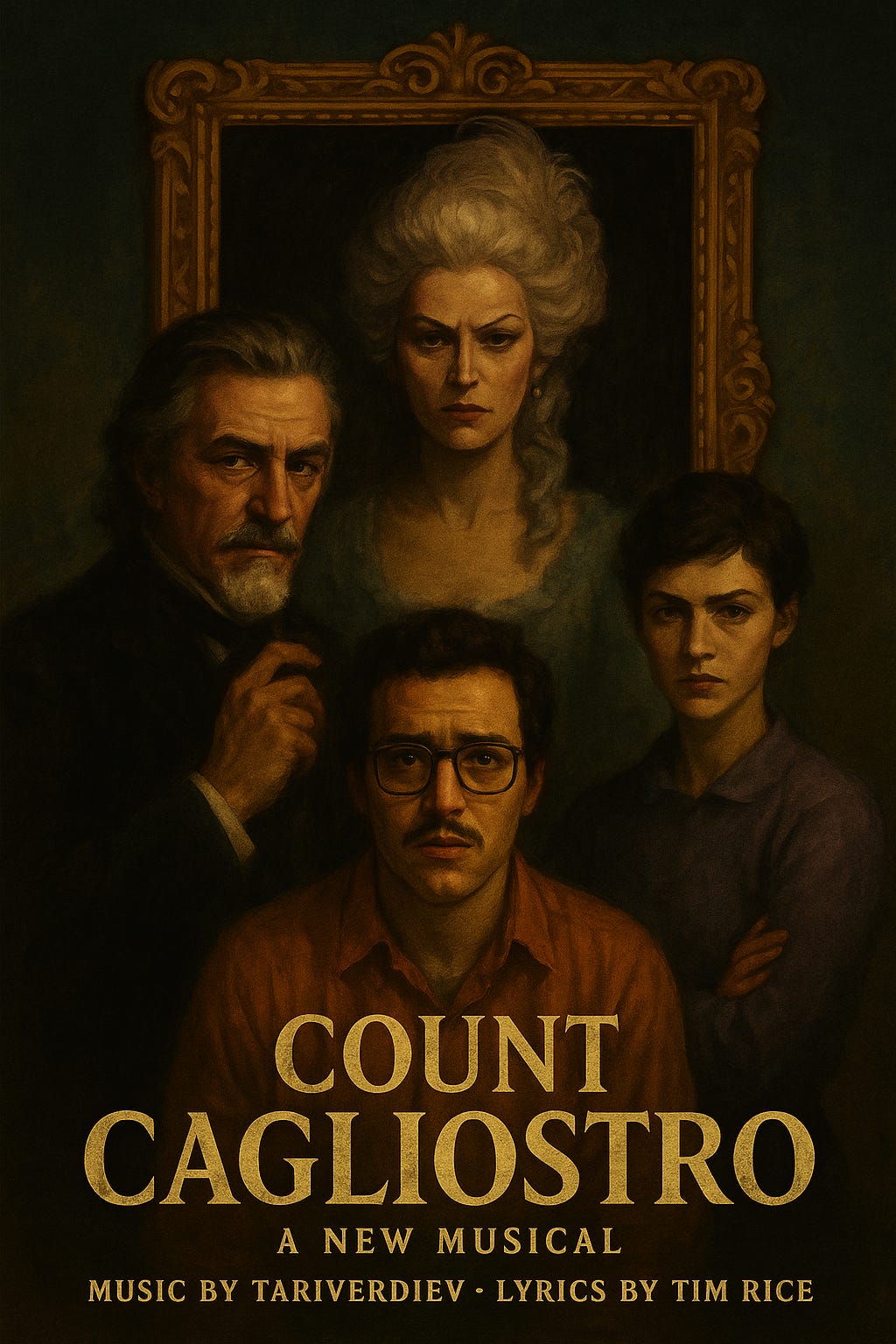Concept Overview: This is a surreal, romantic, and satirical musical adaptation of the 1987 Soviet television musical Count Cagliostro, itself loosely based on Alexei Tolstoy's novel. The English adaptation preserves the whimsical tone, emotional depth, and clever critique of romantic idealism, while leaning into the theatrical possibilities of 18th-century grandeur clashing with modern absurdity.
Creative Direction:
Lyrics: Tim Rice, with his razor-sharp wit and proven ability to blend political commentary, emotional nuance, and humor (Evita, Chess). His role would be to translate and adapt the existing lyrics by Mikael Tariverdiev, keeping them as close to the original as possible, with only minimal cultural clarification where needed.
Music: Tariverdiev’s original score is retained in full. No alterations. It is lush, expressive, and already perfectly suited to the work’s tone and pacing.
Reality Advisors: Same consultants from Chess for accuracy in Soviet details and cultural nuance.
Character Lineup:
Alyosha Fedyashev (Baritone): A brilliant but socially awkward museum researcher with a massive knowledge base and zero romantic intelligence. The ultimate lovable nerd, he is fascinated by the past—especially one alluring portrait.
Maria (Soprano): Alyosha's fellow museum employee and friend, in love with him but perpetually overlooked. Witty, loyal, and ultimately the heroine who sacrifices everything to save him.
Count Cagliostro (Bass-Baritone): A charming, enigmatic time-traveling magician. A figure of both chaos and wisdom, he orchestrates the plot with impish glee but genuine affection for humanity.
Praskovia Petrovna (Coloratura Soprano): A gorgeous, temperamental 18th-century aristocrat whose portrait is magically brought to life. She is self-centered but compelling—a diva in every sense.
Ivan Lozhkin aka John Lock (Tenor): A suave, unscrupulous dealer in antique goods. Resourceful and quick-witted, he's a manipulator who charms his way through life.
The Director (Character Baritone): Pompous, ignorant, and constantly overwhelmed. Think Basil Fawlty crossed with a cultural attaché.
Ensemble: Includes tourists, ghostly courtiers, security guards, museum staff, and Praskovia’s reanimated friends.
Key Musical Elements: All musical numbers are drawn directly from Mikael Tariverdiev’s original score. These include:
Maria’s aria of quiet longing and heartbreak
Alyosha’s emotional monologue on the dissonance between his dream and reality
Cagliostro’s magical invocation
Praskovia’s grand waltz and modern transformation pieces
Ivan’s sly self-justification solo
The haunting, beautifully harmonized quartet by the generals
The finale featuring the musical reset of time, reprised themes, and emotional resolution
Why Now:
Count Cagliostro is a gem of cultural contrast: old versus new, illusion versus reality, idealism versus pragmatism—all themes that resonate powerfully today.
With global audiences more curious than ever about Eastern European art and post-Soviet history, this show provides a whimsical and profound entry point.
The concept of rewriting one's destiny through art and magic feels more relevant than ever in an era of reinvention and nostalgia.
Its mix of romance, satire, and magical realism makes it an ideal candidate for fans of musicals like Hadestown, The Great Comet, and Natasha, Pierre..., while tapping into the niche of Chess enthusiasts and Tariverdiev admirers.
It offers a rare opportunity to showcase a Russian musical legacy that diverges from tragedy and embraces beauty, wit, and hope.
Proposed Cast:
Alyosha (Baritone, intelligent, emotionally awkward) –
Ben Platt – Smart, vulnerable, excellent at playing well-meaning but emotionally tangled men (Dear Evan Hansen).
Alt: Andrew Garfield, if he’s willing to sing again—his Tick Tick Boom gave us hope.
Maria (Soprano, quietly heroic, grounded) –
Phillipa Soo – Graceful, strong, emotionally precise. Her performance in Hamilton shows she can carry this role.
Alt: Jessie Mueller, who brings warmth and clarity in everything from Waitress to Carousel.
Count Cagliostro (Bass-baritone, theatrical, otherworldly) –
Mark Rylance – The gold standard for nuanced theatricality. He radiates calm mystery and could bring that “eternal magician” aura with surgical precision. May not sing often, but he could—and with Tariverdiev’s more lyrical score, that might work beautifully.Mandy Patinkin – Seasoned, soulful, and vocally capable. He can switch from charming to profound in a breath. He’d give Cagliostro a rich, layered performance that’s both enchanting and dangerous.
David Strathairn – Understated and immensely watchable. He has the quiet, commanding presence of someone who knows a thousand secrets. With vocal coaching, he’d deliver a chillingly effective performance.
Alan Cumming (older, bearded version) – He usually plays more flamboyant characters, but if directed toward a quieter, enigmatic tone, he could be a slyly compelling Cagliostro.
Alexander Siddig – Smooth, ageless, intellectually magnetic. His voice and presence would give Cagliostro the feel of someone who’s seen centuries and still finds people amusing.
Praskovia Petrovna (Coloratura soprano, diva energy) –
Audra McDonald – Yes, she’s known for more lyrical mezzo roles, but she has the range, presence, and ability to deliver period drama and comedy.
Alt: Anna O’Byrne – Soprano with serious legit technique and flair for glamorous historical roles (Love Never Dies).
Ivan Lozhkin / “John Lock” (Tenor, slick, morally shady) –
Aaron Tveit – Brings charm and danger in equal parts. Also not above some light con artistry (Moulin Rouge!).
Alt: Jordan Fisher, who can bring a younger, slyer energy with strong vocals.
The Director (Character baritone, comedic) –
Matt Berry – If you want someone to chew scenery like it’s catered, Berry’s the man.
Alt: Stephen Fry, if we want the oblivious pomp and timing of a well-meaning tyrant.
Final Note: A bittersweet ending wrapped in joy, mystery, and timeless love. Praskovia winks from the painting, the museum continues its tours, and Cagliostro slips into the shadows. Curtain.
Tagline: “History is written by the victors, but magic? Magic rewrites the present.”




